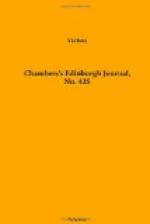This war, we observe, has already found a chronicler, and one peculiarly qualified, both by his knowledge and talent, to do justice to the subject.[1] Although possessing all the essentials of history, however, the book has something more, and is therefore not strictly a history, in the conventional sense of the term; the text as well as the margin being burdened with letters, diaries, and documents of all kinds—the crude materials which it is the province of the historian to digest. The author, notwithstanding, has a clear historical head; his narrative, when he permits it to flow uninterrupted, is animated; his reflections generally philosophical; his summaries of individual character acute and distinct; and so peculiar have been his sources of information, that henceforward no man will sit down to write upon this era of the history of India, or of Central Asia, before carefully consulting the volumes of Mr Kaye.
These volumes, however, comprise between thirteen and fourteen hundred octavo pages, filled with hard names and minute details, and rendered more difficult by the unpardonable want of an index. Although a necessity, therefore, for the more respectable libraries, and a thing to be hoarded by all collectors as a work of reference, the book has little chance of being known to the mass of the public; and we propose, therefore, to arrange the few extracts we are able to give, in such a way as, with the aid of our own filling up, may convey to the general reader—what, we suspect, he has never received before—some distinct idea of one of the most fantastic tricks that ever made the angels weep.
There is no country in the world more secure from external invasion than India; but on the west, more especially, nature has interposed between her and the more civilised powers of Europe and Asia a succession of rivers, mountains, and deserts, absolutely impassable by an army of any formidable magnitude. Notwithstanding this, there had been long an uneasy feeling connected with the idea of the territorial aggrandisement of Russia, and of late years, by the desire manifested by that power to interfere in the affairs of Persia. In 1837-38, therefore, when a Persian army was before Herat, with Russian officers busy in the camp, it is no wonder that, to previously excited imaginations, the danger should have seemed to assume a tangible form. The principality of Herat, although on the other side of intervening deserts, extending for many




